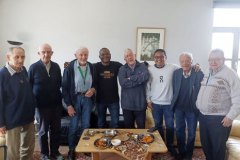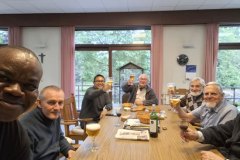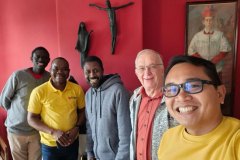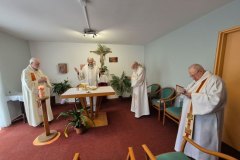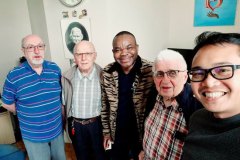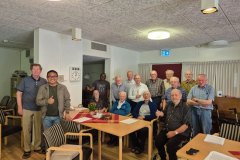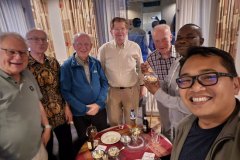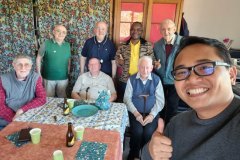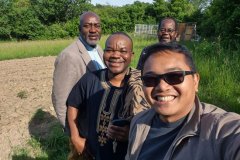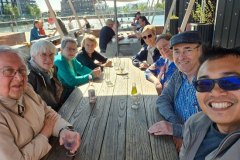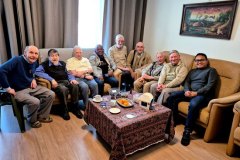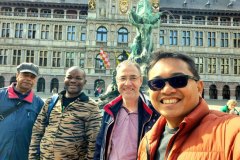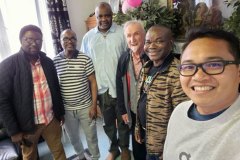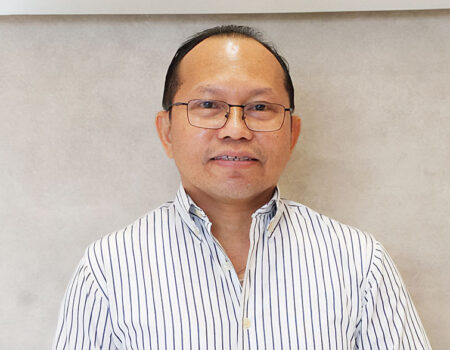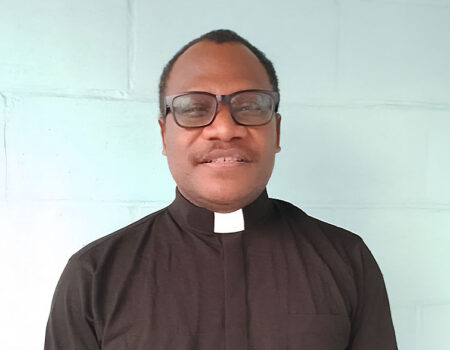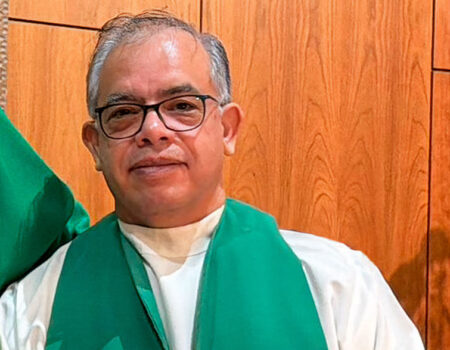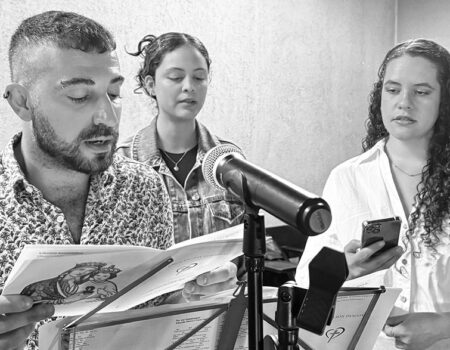Accompaniment: Belgium, The Netherlands, and France
Sunday May 25, 2025
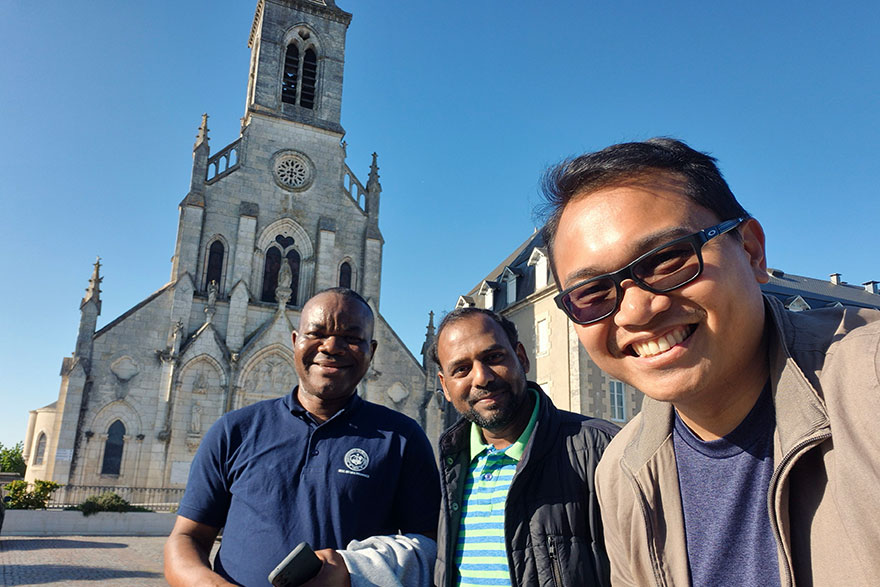
Our journey through Belgium, the Netherlands, and France provided us with a profound opportunity to accompany our Missionaries of the Sacred Heart (MSC) confreres in their daily lives and ministries. This experience not only offered insight into the rich diversity of community life but also encouraged a reflection on the enduring spirit of service that defines the MSC mission.
Belgium
Our accompaniment began in Brussels. Upon arrival, we encountered a noticeable chill in the air, a sign that winter had not yet yielded to spring. Despite the cold, the welcome we received from the community was heartening. Confreres like Celestin Ikakala, Hugo Vangel, Fernand Mahoungou, and Lazare Elenge generously introduced us to their daily work and vibrant parish ministries. Their service to the faithful extended beyond the church walls, as we witnessed firsthand during a moving experience—joining volunteers in a free breakfast program for those in need. This act of love and solidarity with the poor reminded us of a profound truth shared during our conversations: caring for the marginalized is at the very heart of the MSC congregation’s original mission. It was a moment of spiritual reflection that underscored the deep faith and compassion animating their ministry.
From Brussels, we continued our journey to Antwerp. We started with a visit to the MSC Belgian Provincial House for afternoon tea, followed by a trip to the International Community of Belgium (ICB). There, we were warmly welcomed by Martin Eloundou, Epeli Lutua, and Mark van Beeumen. Our evening included a delightful dinner prepared by the community, and later, a joyful moment watching the Champions League semi-final together. This community is engaged in both parochial and categorical ministries. Their categorical outreach is particularly noteworthy: they operate a free lunch program for the poor and refugees, and actively support the elderly. These efforts fall under what they call a “pastoral presence”—a mission to make the Church visible and relevant in the wider society. We departed with hope that this international community would remain sustainable and continue to thrive.
Next, we visited communities in Borgerhout, Rumst, and Asse. At the Provincial House in Borgerhout, we met Bart Devos, Anre Claessens, Oscar Vermeir, Robert Erken, Herman Van Dijck, Marcel De Pauw, and Jean de Nil. The visits to the Rumst and Asse communities provided a different yet equally enriching perspective. Many confreres in these communities are elderly and reside in nursing homes alongside members of other religious groups. Despite health challenges, they remain committed to service in whatever capacity they can—especially within parish life. They generously shared stories from their missionary pasts, particularly their experiences in Congo, which had clearly made a lasting impact. Their wisdom and perseverance were profoundly moving, a testament to a life fully dedicated to others.
The Netherlands
From Borgerhout, we travelled with Andre Claessens to Tilburg in the Netherlands. Following a structural reorganisation last year, the Dutch MSC province is now under the administration of the generalate house. We were welcomed at the Notre Dame community by Hans Kwakman. This facility also houses senior members of the OLSH sisters, and we observed the fruitful cooperation between the two groups.
Despite their age, many confreres remain active in both parish and social ministries. We visited VAI (Vraag and Aanbod International), guided by Theo te Wierik. VAI supports individuals in becoming self-reliant through practical tools, guidance, and training. Another visit, with Anton Egging and Jan van der Zandt, introduced us to MST (Mission Sociale Tilburg), a group that offers language courses, counselling services, and job-search support to vulnerable populations, along with regular meals for those in need.
A meeting with the community revealed a blend of encouragement and concern. While the community continues to make meaningful contributions to society, the closure of the international community in Tilburg has left a sense of loss and highlighted the urgent need for regeneration and continuity in MSC mission work. During our time in the area, we also visited Stein and the Shrine of Our Lady of the Sacred Heart in Sittard—both steeped in MSC heritage.
France
From Tilburg, we traveled by train to Issoudun, via Antwerp. We stayed for several days, visiting local communities and learning about their work. In Le Blanc, Gabriel Naikoua and Pierre Wambo serve the parish and engage in creative farming—gardening and raising chickens, with produce shared with the community. In Orleans, we met Jean Claude, Lionel, and Louis Raymond, three senior confreres living a disciplined, prayer-centered life while continuing their parish ministry.
In Issoudun—the birthplace of the MSC congregation—we had a profound encounter with the international community members Gerard Blattman, Jean Noel Faye, Sebastian and Sumner. Their work is demanding yet deeply symbolic. Serving in Issoudun is a privilege, one that requires serious commitment to language and cultural integration. Their reflections on the need for new members highlighted both the spiritual significance and the practical challenges of continuing the mission in such an important location.
From there, we travelled with Daniel Augie to Marseille and Strasbourg. The Marseille MSCs (Gibert Bonemort, Regis Cuisinet, Pierre Bally, Francois, Jean Pierre Billy, Hilaire Pierre) live in a nursing home, much like their counterparts in Tilburg. It was here that we met Emile Michel, who, at 104 years old, remains a living symbol of MSC dedication. In Strasbourg, we met Louis Boschung, Jean Francois Thorigny, Andre Bohas, and Karl Elsener. They reside next to the former MSC scholasticate, which is now a state-owned school.
Our visit provided a broad and heartfelt perspective on the realities of MSC communities in Western Europe. From youthful energy to seasoned wisdom, from bustling city centres to contemplative rural outposts, the MSC spirit thrives in diverse forms. Categorical ministry—reaching out to the poor, the refugee, and the elderly—remains a strength. Yet, the pressing needs for regeneration, structural clarity, and sustainable community life continue to challenge us. Despite these concerns, the spirituality of presence—our call to be with the people in compassion and service—remains vibrant and powerful in every corner we visited.
Simon Lumpini, MSC (Congo)
Bram Tulusan, MSC (Indonesia)


